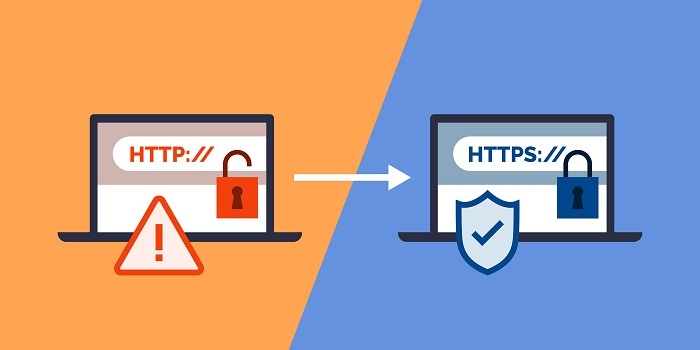
 Data Structure
Data Structure Networking
Networking RDBMS
RDBMS Operating System
Operating System Java
Java MS Excel
MS Excel iOS
iOS HTML
HTML CSS
CSS Android
Android Python
Python C Programming
C Programming C++
C++ C#
C# MongoDB
MongoDB MySQL
MySQL Javascript
Javascript PHP
PHP
- Selected Reading
- UPSC IAS Exams Notes
- Developer's Best Practices
- Questions and Answers
- Effective Resume Writing
- HR Interview Questions
- Computer Glossary
- Who is Who
What Does HTTP Mean in Digital Marketing?
HyperText Transmission Protocol Secure is what it means. By protecting information sent back and forth, this method guarantees a safe connection between a participant's web browser and the website it visits. In order to protect the confidentiality and safety of private data that consumers could provide on a webpage, such as debit and credit card numbers, login passwords, and private information, HTTPS is frequently employed in digital advertising.

Utilizing HTTPS can improve digital advertising campaigns in addition to giving security features by enhancing website reputation and confidence and perhaps enhancing search engine results. All material you transfer over the connections can be viewed in plain sight if you browse an internet page that is not encrypted using HTTPS. The Internet protocol, personal details, and even financial information are all part of this. This data is readily accessible for you to see. The link will read "HTTP//:domain.com" instead of an encrypted "HTTPS://domain.com."
Many consumers may be more willing to believe and interact with a business that indicates a network connection, as Google has said that employing HTTPS can be a major factor in its random search.
Difference between HTTP and HTTPS in digital marketing

Trust, as well as security, are the main differences between HTTP and HTTPS in digital marketing.
All information exchanged between the recipient's web browser and a website can be captured by a private entity since HTTP is not secured. Private information, including numbers for credit cards and private details, may be in danger as a result. Moreover, HTTP-based web pages may be marked somewhat less secure by Google and other major search engines, which may have an effect on results pages and user confidence.
Contrarily, HTTPS employs encrypting to safeguard the information exchanged between two participants' web browsers and the site being visited. This makes sure that just about any data communicated between both the two is safe and cannot be spied on. Because of this, people tend to consider internet sites that employ HTTPS to be considered safer and more reliable, which may help with their online advertising campaigns.
Also, whenever HTTPS is utilized, certain browsers show a status indicator adjacent to the web address to let consumers know the website has been secured. This could result in more consumer engagement, sales, and purchases by boosting user confidence as well as trust in the company.
Working of HTTPS
In order to ensure that just about any information shared is safe and is unable to be accessed by a service provider, HTTPS acts by protecting the information passed here between the participant's browser and the website is accessed. Routing platforms, SSL (Secure Sockets Layer), and TLS are combined to accomplish this (Transport Layer Security).
An operating system establishes a connection with the computer serving the domain when they access it by using HTTPS. The web can establish secure connections by using the unique identifier in the SSL/TLS credential that the node sends to the site as a response.
A unique key is maintained by the internet device and the server is used to encode any data transmitted once the strong link has been established.
HTTPS is crucial in digital marketing since it guards against unwanted players or attackers intercepting important documents, like credit card details and confidential info. As a result, user confidence in a webpage may rise, and marketing objectives may be enhanced. Furthermore, since web pages like Google prioritize protected internet sites in their search rankings, adopting HTTPS may help businesses rank greater in search results.
Why HTTPS matters in digital marketing
For a number of reasons, HTTPS is important in digital marketing.
Protection ? HTTPS adds an extra degree of protection for consumer data by compressing the data sent to another participant's browser and a website's server. Preventing hackers and some other unscrupulous agents from intercepting confidential material, such as credit card numbers and confidential info, helps to safeguard it.
Trust ? The usage of HTTPS communicates to users that a business takes individual safety and confidentiality properly, which can make users feel more confident and trusting of the website. Attention, exchange rates, and client maintenance may all be enhanced as a result.
Web Browser Positions ? Because secure websites perform better in search results on search engines like Google, implementing HTTPS may help a website's position in search engine results. This may increase the number of visitors to the website and raise its exposure and brand recognition.
Compliance ? When acquiring private data from customers, several sectors of the economy and legal systems have laws requiring webpages to utilize HTTPS. Fees and damages as well as harm to a person's performance may occur from failing to adhere to these requirements.
Ultimately, HTTPS is crucial to digital marketing since it assists to safeguard user information, fostering trust among consumers, raising page ranks in search engines, and assuring compliance with regulations.
Convert HTTP sites to HTTPS
These procedures can be used to reroute HTTP traffic to HTTPS web pages ?
Download an SSL certificate ? The server hosting your webpage has to have an SSL certificate configured. This certification will secure and encode the information on your webpage.
Change your webpage script ? To switch HTTP queries to HTTPS, you must change your webpage script. You may accomplish this by including the following code in the access file for your official site ?
RewriteEngine On
RewriteCond %{HTTPS} off
RewriteRule ^(.*)$ https://%{HTTP_HOST}%{REQUEST_URI} [L,R=301]
How secure is HTTPS?
In digital marketing and some other electronic payments, private data is frequently exchanged through the network and is protected by HTTPS, which is regarded as a higher level of security. Compressing information communicated between one user's web browser and the website it visits, provides another level of protection and makes it far more expensive for cyberattacks or other hostile agents to monitor or obtain the information.
Although HTTPS is a security standard, it is crucial to remember that it is not error-proof. There are numerous occasions where SSL/TLS protocols have had security bugs that cybercriminals have utilized, and there's always the possibility of information losses or other security risks.
Following best practices for data protection, such as routinely upgrading SSL/TLS licenses, utilizing powerful block ciphers, and making sure that infrastructure is designed appropriately to avoid breaches, is crucial to minimizing the dangers connected with using HTTPS in digital marketing. Furthermore, it's critical to educate staff members and consumers about possible risks to security including scammers and techniques for social engineering.
Although HTTPS is largely perceived as a secure network for sending personal information, it's still vital to be watchful and take precautions to reduce risks and ensure the integrity of user data.
Conclusion
In summary, HTTPS is crucial to digital marketing because that adds an extra degree of protection for personal data, fosters consumer trustworthiness, and can raise rankings. HTTPS prevents the theft of confidential documents, including credit card details and personally identifiable information, by safeguarding information exchanged between the recipient's browser and a web page.
The very first process in putting HTTPS on a business webpage is to get an SSL/TLS certificate and configure it on your web application. To ensure that your site remains safe, it's crucial to adhere to best practices for security breaches and to routinely maintain your SSL/TLS credentials.

